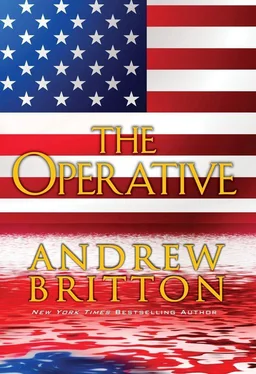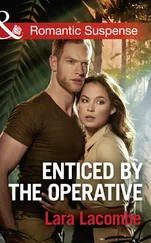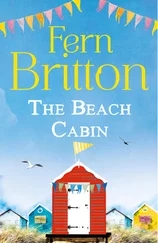Andrew Britton - The Operative
Здесь есть возможность читать онлайн «Andrew Britton - The Operative» весь текст электронной книги совершенно бесплатно (целиком полную версию без сокращений). В некоторых случаях можно слушать аудио, скачать через торрент в формате fb2 и присутствует краткое содержание. Жанр: Триллер, на английском языке. Описание произведения, (предисловие) а так же отзывы посетителей доступны на портале библиотеки ЛибКат.
- Название:The Operative
- Автор:
- Жанр:
- Год:неизвестен
- ISBN:нет данных
- Рейтинг книги:5 / 5. Голосов: 1
-
Избранное:Добавить в избранное
- Отзывы:
-
Ваша оценка:
- 100
- 1
- 2
- 3
- 4
- 5
The Operative: краткое содержание, описание и аннотация
Предлагаем к чтению аннотацию, описание, краткое содержание или предисловие (зависит от того, что написал сам автор книги «The Operative»). Если вы не нашли необходимую информацию о книге — напишите в комментариях, мы постараемся отыскать её.
The Operative — читать онлайн бесплатно полную книгу (весь текст) целиком
Ниже представлен текст книги, разбитый по страницам. Система сохранения места последней прочитанной страницы, позволяет с удобством читать онлайн бесплатно книгу «The Operative», без необходимости каждый раз заново искать на чём Вы остановились. Поставьте закладку, и сможете в любой момент перейти на страницу, на которой закончили чтение.
Интервал:
Закладка:
Kealey looked north toward Charles, swiveled around, and looked west. The smoke was lighter on Conway Street and thickest over the rooftops several blocks to the northwest, where it was brewing up in a massive rooster tail, its dark fan-shaped crest spreading out almost directly overhead.
“What do you know about the layout of the center?” he asked.
“Not much,” she said, raising her voice to be heard through the scarf and the surrounding commotion. “It’s really two different buildings. The one right here on Charles is the original center.”
“Where is the job fair being held?”
“The newer one,” she said. “The main entrance is on Howard Street. It’s a busy part of town.”
“Busy in what way?”
“The warehouse on Eutaw borders on the Orioles’ ballpark,” she said. “There are shops on the main floor, offices, just a lot of things like that.”
Kealey continued looking east, lowering his gaze to the long, ruler-straight building that cut off Conroy about a quarter mile up.
“The sky bridge connected the Hilton Hotel to the convention center, right?”
She nodded. “Across Howard, where the entrance is.”
“We’ll never get in that way.”
“There’s another walkway between the old and new parts of the center on Sharp Street, a smaller version of the sky bridge. It crosses Conway a block or so up, right past Old Otterbein.”
“Past what?”
“Otterbein’s a landmark church,” she said. “When you turn up Sharp, there are entrances to both buildings on either side of the street. The walkway runs above them.”
Kealey tried to shut out the frenzied commotion around them. Charles was impassable, with vehicular traffic at a standstill all the way from Pratt Street and people moving between it. The first responders would already be establishing control of the remaining access points to the area. There was a time when his CIA credentials would have gotten him past whatever barriers they raised-but it had been years since he’d had any official connection to the Company, and the expired ID he’d never quite managed to clean out of his card holder wouldn’t bear scrutiny.
He gazed up Conroy. While traffic there was also at a crawl, it hadn’t gotten nearly as bad as on Charles, probably because it wasn’t a crosstown artery. Nor did he see any police cars or firefighting vehicles shooting along it yet-for the same reason, he suspected. They would have gone directly to the scene of the explosion on Howard, then cordoned off the roads and sidewalks there around the center’s newer extension. The back and side approaches were the last that would be restricted-and therefore were his best shot at gaining entry.
“We’ll take Conroy,” he said. “I’m going to need you to guide us as we get closer.” He gazed into her red, tearing eyes, then clutched her hand. “I’m glad you overruled me.”
She offered the thinnest of smiles beneath the mask as they moved into the maelstrom.
CHAPTER 4
ATLANTA, GEORGIA
The red and orange dahlias already clipped and in water, Jacob Edward Trask lifted one of the galvanized-steel flower containers that Robinson had filled and set out for him. He carefully checked that the water level wasn’t too high, then moved down the greenhouse aisle toward the gerberas. It would be another half hour or so before his visitor arrived from Atlanta’s Hartsfield-Jackson, assuming light airport traffic on Interstate 20. That the roads would be clear seemed almost a given; everyone would be watching the news on whatever devices one watched the news these days. He was no longer sure.
That’s part of the problem, the sixty-four-year-old man thought, his thin lips tightening. News comes from networks, from cable, from newspaper Web sites, from amateurs on the scene, from bloggers who turn fact into opinion, and then from other bloggers who transmit that opinion as fact. It’s the game of telephone with pathetic results.
It was another component of the continuing fragmentation of America. Disinformation and misinformation were an extension of the misbegotten hyphenates-the African-Americans, the Muslim-Americans, the Gay-Americans, and the latest absurdity, the Single-Mom-Americans. Nearly one hundred years ago, Theodore Roosevelt had warned about the carving of the nation. “A hyphenated American is not an American at all,” he’d said. “The one absolutely certain way of bringing this nation to ruin would be to permit it to become a tangle of squabbling nationalities.”
Dressed in a gray sweat suit, the tall, lanky, still-athletic man continued to move down the line. Reaching the trays of potted daisies, Trask began clipping them with his floral shears, cutting the stems at an angle to give them more surface area for water absorption. He would place each flower in the container, one at a time, after pinching the dead cuttings off their stems. Then he would give them to the executive housekeeper to have them displayed around the mansion, where he could see them and be comforted by them. They were like children, except that they didn’t fight over the estate.
Trask enjoyed his horticulture, particularly at dusk, when the wafting fragrance was at its peak. And especially now, when his mind was consumed with all that needed to be done. The physical activity and sensory input helped him to relax, to forget the awesome burden he had taken on.
He smiled inside when he thought back to all the times he had heard himself referred to as a dabbler, a dilettante. That had not happened so much in recent years. There was a benefit to seeing one’s youth recede farther and farther. On the one hand there was wisdom accrued and insights formed. On the other, the insatiable paparazzi, who had once fixated on him, had long since moved on to newer, younger heirs, men and women who knew how to play the media rather than duck it. That was not a skill he had ever mastered. His methods had been pointlessly confrontational, since only that fed the beast.
Even his own child was largely immune. Industrialists’ heirs were out of favor, along with the scions of tobacco, steel, and auto-industry families. They were toxic by association, too twentieth century, too American. While U.S. consumers were still passively fixated on young celebrities in rehab for drugs or drink or sex or food addictions, the international gossip trade wanted to know about the youthful tech titans, not from Silicon Valley, but from Japan’s Fukuoka City and India’s Bangalore. They wanted more about the “green teens,” the youthful champions of clean energy in Birdsville, Queensland, and Jesmond, British Columbia. Outside of the United States, visionaries were the new idols. Other nations were producing the next generation of Fords and Carnegies, of Jobses and Gateses. Their lives were followed and actively emulated.
They were on track to shape the future.
While we are marginalized, he thought, our carcass picked apart by speculators and gloaters, by the third-world mouths we continue to feed and protect to maturity so they can spit in our eye.
The glass door opened silently behind him. Trask knew it from the faint whisper of cool air that brushed his neck. He also knew, without turning, the angel-light tread of his valet, Peter Robinson.
“Sir?” said Robinson.
“She’s here?” Trask asked without turning.
“Yes, sir,” the young man replied.
“Take her to the sunroom. I’ll be there when I am ready.”
“Yes, sir.” There was a catch in his voice.
“Mr. Robinson, what’s the latest on Baltimore?”
“The situation is still very chaotic,” Robinson replied. He seemed pleased to have been asked, allowed to react. “No one seems to know whether this is an isolated incident or part of a larger-scale event. Homeland Security has promised a press conference at seven p.m.”
Читать дальшеИнтервал:
Закладка:
Похожие книги на «The Operative»
Представляем Вашему вниманию похожие книги на «The Operative» списком для выбора. Мы отобрали схожую по названию и смыслу литературу в надежде предоставить читателям больше вариантов отыскать новые, интересные, ещё непрочитанные произведения.
Обсуждение, отзывы о книге «The Operative» и просто собственные мнения читателей. Оставьте ваши комментарии, напишите, что Вы думаете о произведении, его смысле или главных героях. Укажите что конкретно понравилось, а что нет, и почему Вы так считаете.












